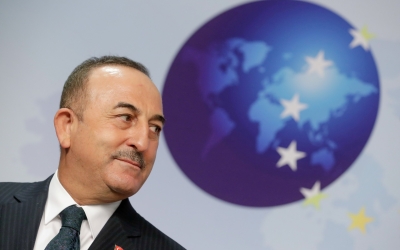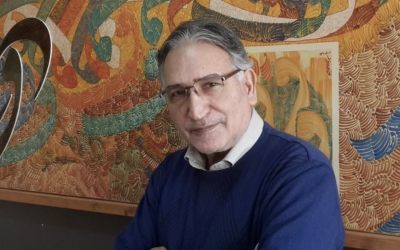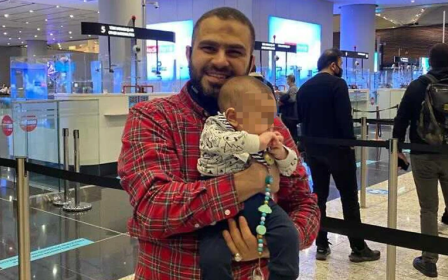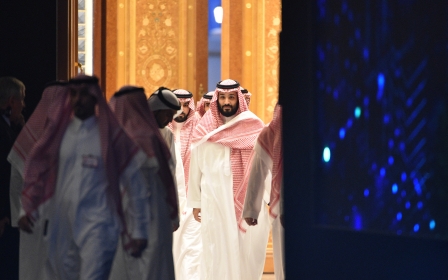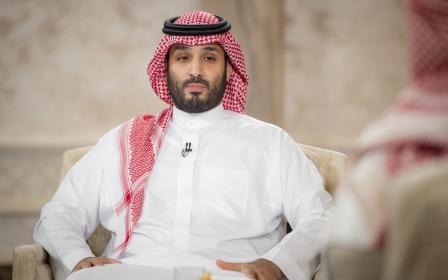Saudi Arabia-Iran rapprochement: What is driving push for diplomacy?
"We know we are a main target for the Iranian regime... We will not wait until the battle is in Saudi Arabia. We will work so that the battle is at theirs in Iran."
- Saudi Crown Prince Mohammed bin Salman, 2017
"Iran is a neighbouring country. We want good and special relations with Iran. We don't want Iran's situation to be difficult. On the contrary, we want Iran to be prosperous."
- Saudi Crown Prince Mohammed bin Salman, 2021
Even by the standards of the ever-shifting geopolitics of the Middle East, bin Salman's turn from talks of war to wanting neighbourly relations with Iran is a sharp one.
With Donald Trump gone, a new US administration pursuing talks with the Iranian government, and the Houthis intensifying attacks against the kingdom, the crown prince is now looking to diplomacy after years of aggressive foreign policy failed to produce desired results.
"It's really amazing, the change. Just the tone is quite different," said Jean-François Seznec, an expert in Saudi affairs and a scholar at the Atlantic Council and Middle East Institute.
The crown prince, known as MBS, is not confident of the Biden administration's unconditional backing of Saudi Arabia, Seznec told MEE.
"So rather than having to prepare for war with Iran without the full support of the United States, I think they prefer 'let's talk and see what happens'."
Riyadh and Tehran have been holding secret talks since last month to ease tensions between the two countries, according to numerous media reports.
'Special relations'
During an interview with Al Arabiya last week, MBS outlined issues with Iran - support for militias and its ballistic missile and nuclear programmes. He said, however, that the kingdom was working with "partners in the region and the world" to resolve the problems and establish "positive" ties with Tehran.
He described Iran as a neighbourly state with which disagreements could be overcome, and "special relations" established.
Less than four years earlier, shortly before replacing his cousin, Mohammed bin Nayef, as crown prince, MBS portrayed the Islamic Republic as an inherently "extremist" regime seeking expansion to spread a politicised version of Shia Islam.
At the time, he suggested that holding talks with Iran was futile because Tehran's ideology did not respond to negotiations. "The mutual points that we can agree on with this regime? They are almost nonexistent," the then-deputy crown prince said in 2017.
Now the de-facto Saudi ruler is softening his tone, not only on Iran, but also on the kingdom's most direct foes in Yemen - the Houthis.
After years of ferociously bombing Yemen and casting the Yemeni rebels as Iran-backed terrorists, during last week's interview, he extended an unmistakable olive branch to the Houthis.
He reiterated the kingdom's ceasefire offer and hinted at the prospect of economic support for Yemen, urging the rebels to sit at the negotiations table. The crown prince even acknowledged that the Houthis were Yemenis and Arabs - not merely agents of Iran.
This week, Saudi Arabia's intelligence chief also met with his Syrian counterpart in Damascus, according to a report by the Guardian, in another sign of the broad push towards lowering the temperature in the region.
So what is driving Riyadh's plunge into diplomacy after years of combative posturing?
While the intuitive answer for many Americans may be Biden's election, Kristian Coates Ulrichsen, a Middle East fellow at Rice University's Baker Institute for Public Policy, says the catalyst for the shift predates the Democratic president's ascension to the White House.
A drone attack on major Saudi oil installations in September 2019 exposed the kingdom's vulnerabilities, Ulrichsen said, especially as then-President Trump refused to respond against Iran, the prime suspect in the incident that reportedly cost the kingdom $2bn.
The lack of US action seemed to tell Trump's closest allies in the region, MBS and his Emirati counterpart Mohammed bin Zayed: "You're on your own," Ulrichsen told MEE.
"The US response really changed the regional calculation for MBS and MBZ," he said. "Rather than thinking 'we can always rely on US support no matter what', they felt that they had to at least explore ways to de-escalate tensions, because obviously, they had to find ways to coexist because Iran is their neighbour."
Ulrichsen added that Trump's loss to Biden, who is seeking talks with Iran and appears less interested in the Middle East overall amid more immediate issues at home, intensified the Saudi shift to diplomacy.
Sina Toossi, a senior research analyst at the National Iranian American Council (NIAC), echoed Ulrichsen's comments. He said Saudi Arabia had put all of its eggs in Trump's basket, but the attack on the Aramco facilities showed the limits of Washington's willingness to protect its Gulf allies.
"That perception that they had a US security guarantee, it was smashed during the Trump era," Toossi told MEE.
He added that Saudi Arabia and the UAE realised that "maximum pressure" would not lead to Iran's collapse, while Washington's commitment to Riyadh's security has its limits.
"This conclusion started forming more in these countries, and the forecast is clear: 'America's leaving this region, and it's going to be us and the Iranians and Qatar and the Turks and the Syrians'," Toossi said.
"These hyper-aggressive policies that they've had didn't produce any results for them. They backfired."
'A good thing'
US Secretary of State Antony Blinken endorsed Saudi-Iranian rapprochement this week without confirming that bilateral talks were taking place.
"If they’re talking, I think that’s generally a good thing," Blinken told the Financial Times.
"Talking is usually better than the alternative. Does it lead to results? That's another question. But talking, trying to take down tensions, trying to see if there's a modus vivendi, trying to get countries to take actions on things they're doing that you don't like - that's good, that's positive."
The Biden administration has pledged to reassess relations with the kingdom after four years of cosy ties between Riyadh and Washington under Trump. The former president's first foreign trip from the White House in 2017 was to Saudi Arabia.
Shortly after taking office early in 2021, Biden announced the end of US support for Saudi Arabia's "offensive operations" in Yemen and called unequivocally for an end to the war. He also ordered the release of a report revealing the US intelligence community's assessment on the murder of Jamal Khashoggi, which laid the blame at the feet of MBS himself.
'MBS and the Saudis have tried to reassure the Biden administration that they, too, have learned the lessons of the last four years'
- Kristian Coates Ulrichsen, Rice University
In the meantime, the US administration is engaged in indirect nuclear talks with Iran and denouncing Trump's maximum pressure campaign of sanctions against the Islamic Republic as a failure.
And it's not only Biden that the Saudis have to worry about. The president has a Democratic Party behind him with control of both chambers of Congress that is increasingly critical of Riyadh. The gruesome killing of Khashoggi, a US-based journalist, was a turning point for US-Saudi relations, particularly in Congress, where Democrats are still pushing for measures to punish MBS beyond Biden's moves.
The 2018 murder of the journalist, who wrote for the Washington Post and Middle East Eye, sharpened criticism of other Saudi policies by Democrats, including the war in Yemen, the Qatar blockade and the kidnapping of Lebanese Prime Minister Saad Hariri a year earlier.
The Gulf crisis with Qatar was resolved weeks before Biden took office, and now Saudi Arabia is seeking a ceasefire in Yemen. Dialogue with Iran appears to be another major step in the opposite direction of previous policies.
"With Trump leaving office, I think MBS and the Saudis have tried to reassure the Biden administration that they, too, have learned the lessons of the last four years," Ulrichsen said.
Saudi-Iranian relations
Saudi Arabia and Iran have never been close allies. Tensions have been the hallmark of their ties since the Islamic revolution that established the current Iranian ruling system in 1979. Since then, regional competition, ideological differences and proxy conflicts have defined relations between the two.
Early on, Saudi Arabia backed Iraq's Saddam Hussein's invasion of Iran in 1980 - a war that lasted nearly eight years and claimed the lives of hundreds of thousands of people. Relations improved in the 1990s, but the US-led invasion of Iraq in 2003 inflamed sectarianism in the region and renewed the rivalry.
In more recent times, Iran and Saudi Arabia have found themselves on the opposite sides of the perpetual political deadlock in Lebanon, the war in Syria and the conflict in Yemen. In 2016, bilateral ties broke down completely after Iranian protesters stormed Riyadh's embassy in Tehran in response to the execution of prominent Saudi Shia cleric Nimr al-Nimr.
Seznec says improving ties between Riyadh and Tehran could ease crises across the region.
"Assuming there was some kind of rapprochement between Iran and Saudi Arabia, it would make a huge difference on the Lebanese file, and it would make a huge difference on the Syrian file and certainly with the Houthis in Yemen," Seznec told MEE.
"It would make a big, big difference in the region. I mean, God forbid, we could have peace."
Moreover, Seznec added, the two countries could benefit directly from warm ties, including by working together to control and raise the price of oil.
Toossi, of NIAC, said, despite the rivalry between Tehran in Riyadh, the countries had mutual interests, including in energy and security.
"I think we are on the cusp of potentially a more optimistic, more stable regional order," Toossi said. "And the US has a big role to play in encouraging regional dialogue and cooperation, as opposed to trying to dissuade it, which is what was happening under the Trump administration."
Middle East Eye propose une couverture et une analyse indépendantes et incomparables du Moyen-Orient, de l’Afrique du Nord et d’autres régions du monde. Pour en savoir plus sur la reprise de ce contenu et les frais qui s’appliquent, veuillez remplir ce formulaire [en anglais]. Pour en savoir plus sur MEE, cliquez ici [en anglais].


